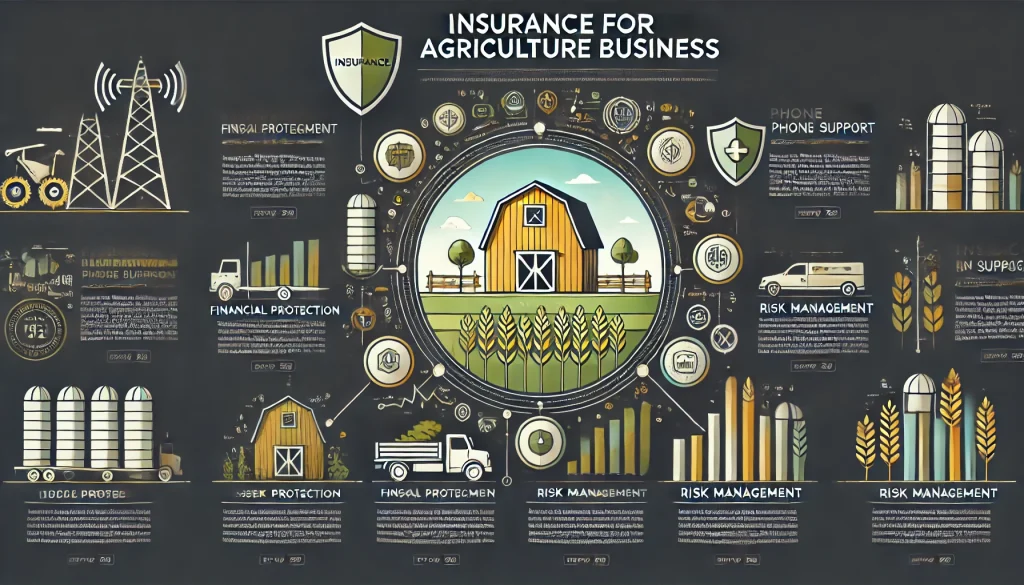Insurance for Agriculture Business
In the agriculture industry, the stakes are high. From unpredictable weather patterns to fluctuating markets, agricultural businesses face unique risks. Protecting your livelihood requires careful planning and the right type of insurance coverage. That’s where insurance for agriculture business comes into play. Whether you run a small farm or a large agribusiness, having the right insurance plan can mean the difference between thriving in the face of adversity or facing significant losses. In this blog, we’ll delve into why agricultural insurance is critical and what types of coverage you should consider to safeguard your operations.
Understanding the Importance of Insurance for Agriculture Businesses
Farming and agriculture businesses operate in an environment filled with uncertainty. Natural disasters like floods, droughts, and hail can wipe out crops in a matter of hours. Livestock can be lost to disease, and equipment failures can halt operations. Beyond these risks, agricultural businesses also face the same risks that other businesses do—liability claims, property damage, and employee injuries.
The right insurance for agriculture business provides a financial safety net, helping farmers and agricultural business owners mitigate losses. Without insurance, one catastrophic event could mean the end of a business that has been built over years, if not generations. Comprehensive insurance policies ensure that even in the face of unpredictable events, your business can recover and continue operating.
In addition to risk protection, insurance also offers peace of mind. Knowing that you are covered allows you to focus on running your business rather than constantly worrying about “what if” scenarios. This is particularly important in an industry where margins can be tight, and profit relies on stability and consistency.
Types of Insurance Coverage for Agriculture Businesses
There are various types of insurance coverage tailored to the agriculture sector, each addressing specific needs. Let’s take a closer look at the most essential forms of insurance for agriculture business that every farm or agribusiness owner should consider.
Crop Insurance: Perhaps one of the most critical types of insurance for farmers, crop insurance protects against the loss of crops due to natural disasters like floods, droughts, and hail, or even issues like disease or pest infestations. This type of insurance ensures that you can recover financially, even when Mother Nature doesn’t cooperate.
Livestock Insurance: For farmers who raise animals, livestock insurance provides coverage for losses due to disease, injury, or death. Whether you’re running a small-scale family farm or a large operation, livestock insurance helps you manage the risk associated with raising animals and ensures that your investment is protected.
Property Insurance: Agriculture businesses typically have significant investments in property, including land, buildings, and specialized equipment. Property insurance covers these assets in the event of damage or loss due to fire, natural disasters, theft, or vandalism. This type of coverage is crucial for ensuring that your operations can continue after a loss.
Farm Vehicle Insurance: Just like any business, vehicles used in agricultural operations—tractors, trucks, and other machinery—need to be insured. Farm vehicle insurance provides coverage for damage, liability, and loss of these critical pieces of equipment.
Liability Insurance: Agriculture businesses face a range of potential liability risks, from injuries sustained by visitors on the farm to product liability claims. Liability insurance helps protect your business from lawsuits and can cover legal fees, settlements, or judgments in the event of a claim.
Workers’ Compensation Insurance: If you have employees working on your farm or in your agricultural business, workers’ compensation insurance is essential. This coverage provides benefits to employees who are injured or become ill as a result of their work and protects your business from costly lawsuits.
Why Crop Insurance is Essential for Farmers
Crops are the lifeblood of any farm, but they are also vulnerable to a wide range of risks. Droughts, floods, frost, disease, and pests can all wreak havoc on crops, and without insurance, farmers are left to bear the full financial burden of these losses. Crop insurance is designed to protect farmers from such risks by providing financial compensation when crop yields are affected.
Insurance for agriculture business that includes crop coverage is a crucial tool in managing agricultural risk. For instance, in years where drought significantly reduces yields, crop insurance can help farmers recover a portion of their lost income, ensuring they can plant again the next year. Without this type of safety net, many farmers would be unable to sustain their operations after a major crop failure.
Crop insurance policies can also cover revenue losses due to price fluctuations in the market. This is particularly important for crops like corn, soybeans, and wheat, where market prices can vary significantly from year to year. By insuring both yield and price, crop insurance helps stabilize farm income, providing a level of certainty in an inherently uncertain business.
The Role of Livestock Insurance in Protecting Your Assets
For farmers involved in animal husbandry, livestock insurance is a vital form of coverage. Livestock are valuable assets, and losses due to disease, injury, or even theft can have a significant financial impact on your business. With the right insurance for agriculture business, farmers can protect their investment in livestock and ensure the continuity of their operations.
Livestock insurance covers a wide range of risks. For example, if a farmer loses a portion of their herd due to an outbreak of disease, the insurance policy can provide financial compensation to replace the animals. This type of coverage can also extend to incidents such as accidental injury, weather-related deaths, and even predator attacks. For larger operations, this coverage is essential to protect the business from catastrophic losses.
Additionally, some policies offer specialized coverage for specific types of livestock, such as dairy cows, poultry, or breeding animals. This ensures that the insurance is tailored to the unique needs of the farmer’s operation, providing a customized approach to risk management.
FAQs About Insurance for Agriculture Business
What is the most important type of insurance for agriculture businesses?
There isn’t a one-size-fits-all answer, but for many agriculture businesses, crop insurance and property insurance are the most critical. These cover the most common risks, such as natural disasters and damage to buildings or equipment.
Does insurance cover equipment breakdowns on a farm?
Yes, equipment breakdown insurance is available as part of property insurance or as a stand-alone policy. It covers the cost of repairing or replacing essential machinery that breaks down, allowing farm operations to continue without significant delays.
Can I insure my farm’s income against market fluctuations?
Yes, some crop insurance policies offer revenue protection, which compensates farmers for losses due to both yield reductions and market price declines. This type of coverage provides stability in volatile markets.
Is liability insurance necessary for small farms?
Yes, even small farms face liability risks. For example, if a visitor is injured on your farm or a product you sell causes harm, liability insurance can protect you from costly lawsuits.
Are there insurance options for organic or specialty farms?
Yes, there are insurance policies specifically designed for organic and specialty farms. These policies take into account the unique risks associated with growing organic crops or raising niche livestock.
What is the best way to determine my insurance needs as a farmer?
Consulting with an insurance agent who specializes in agriculture is the best way to assess your coverage needs. They can help you evaluate your risks and recommend the right combination of policies for your business.
Why Property Insurance Is a Must-Have for Agricultural Businesses
Agricultural properties are often expansive and include a variety of structures, such as barns, silos, greenhouses, and even residential buildings. Each of these structures represents a significant investment, and damage from events like fires, storms, or vandalism can lead to costly repairs or replacements. Property insurance ensures that your assets are protected from such risks, allowing you to rebuild or repair without bearing the full financial burden.
Property insurance doesn’t just cover physical structures; it also covers the equipment and tools that keep your agricultural operations running. Tractors, plows, irrigation systems, and other machinery can be incredibly expensive to repair or replace, and without them, farm productivity can grind to a halt. A well-structured property insurance policy can provide coverage for both your buildings and your equipment, ensuring that your business can continue to operate even in the face of adversity.
The Benefits of Comprehensive Liability Insurance
Liability insurance is another crucial component of insurance for agriculture business. It protects you from the financial consequences of lawsuits related to personal injury, property damage, or product liability. For example, if someone is injured on your farm or if a product you sell causes harm to a customer, liability insurance can cover the legal fees, settlements, or judgments that may arise from such incidents.
In the agriculture industry, liability risks can come from many different sources. Visitors to the farm, whether for business or leisure, may get injured, leading to costly medical bills and potential lawsuits. Liability insurance ensures that your business is protected from these financial risks, allowing you to focus on your operations without constantly






